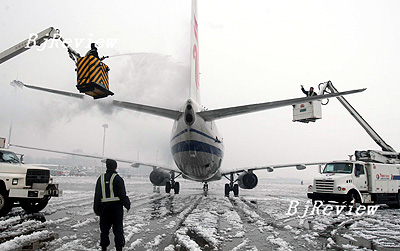|

China has quickly emerged from the chaos caused by the most severe snowstorms to hit the southern part of the country in half a century, with daily life in the worst hit areas gradually returning to normal after transportation networks and services and power supplies were restored.
At an executive meeting on February 13, the State Council demanded that power supplies in the affected areas be completely restored by the end of March, while transport facilities, telecom networks and radio and TV broadcasting networks resume normal service as quickly as possible. A Xinhua News Agency report called the council's order "a turning point" that shifted the focus of the country's efforts "from disaster relief to reconstruction of the badly hit areas."
The State Council also made detailed plans for restoring industrial and agricultural production in the affected areas, including providing crop seeds and food to farmers and increasing coal, power and oil shipments to affected areas.
In its daily progress brief on the recovery efforts, the Disaster Relief and Emergency Command Center under the State Council said on February 13 that rail and highway transportation networks were operating as normal throughout the country. The railway networks transported 5.01 million passengers on February 12, a new daily record since the Spring Festival travel season started on January 23. All airports in the country were open and operating as usual, the brief said.
Also by February 12, the State Grid had restored power to 93.6 percent of customers in the affected areas, the brief said. The nation's stockpile of coal had reached 24.25 million tons, almost 600,000 tons more than the previous day and enough to sustain power stations for 12 days on average. Prices for basic daily necessities in the disaster-stricken areas remained steady, with prices for meat, eggs and vegetables dropping slightly in most areas, the brief said.
President Hu Jintao, who is also Chairman of the Central Military Commission of the Communist Party of China, called on China's armed forces to regard post-snowstorm reconstruction as their top priority. By February 11, about 643,000 military troops and armed police and 1.87 million paramilitary troops had been mobilized to participate in disaster relief efforts. The Central Military Commission issued a report that day, asking troops in snow-hit regions to continue the good work they had done over the past weeks, during which they provided quick disaster relief and helped restore normal operations in the devastated areas.
The government's preliminary statistics indicate that military troops and armed police had donated a total of 123 million yuan ($17.1 million) and more than 1.5 million warm clothes and cotton-filled quilts to storm-devastated areas as of February 11. The Ministry of Civil Affairs said on February 12 that donations of money and items for disaster relief had totaled 1.195 billion yuan ($166 million).
Domestic insurers have paid more than 1 billion yuan ($139 million) for snow-related claims in the southern provinces, but millions more may yet be paid, according to the China Insurance Regulatory Commission. Earlier this month, the commission warned insurance firms not to reject, delay or reduce their payouts on weather-related claims.
As of February 12, the snowstorms in the southern part of the country had caused 107 deaths and eight missing persons. The bad weather also racked 111.1 billion yuan ($15.4 billion) in direct financial losses. The 21 provinces, autonomous regions and municipalities affected by the disaster had conducted emergency evacuations of 1.5 million people and offered aid to 1.9 million passengers in trains or vehicles stranded by snowstorms. A total of 11.8 million hectares of farmland had been affected, of which 169 hectares were rendered unproductive and barren. Nearly 17.3 million hectares of forests had been damaged.
Source: Ministry of Civil Affairs
1 BRINGING LIGHT: Troops stationed in Guangxi Zhuang Autonomous Region transport power tower components on lunar New Year's Eve to replace ones crushed by sleet and snow
2 HOME COMFORTS: Migrant workers from southwestern Sichuan Province working in Fuzhou, Fujian Province enjoy their lunar New Year Eve meal provided by the local government. Workers were left stranded with no way home after snowstorms paralyzed transportation in southern provinces
3 SPECIAL NEW YEAR'S EVE: Premier Wen Jiabao spends lunar New Year's Eve on February 6, having dinner with more than 160 students at Jiangxi University of Finance and Economics. The students could not return to their hometowns for traditional holiday family reunions
4 FULL STEAM AHEAD: Coal manufacturers and transporters worked throughout the weeklong Spring Festival holiday to get as much coal as possible to thermal power plants around the country
5 READY FOR TAKE OFF: Aircraft deicing machines spray fluid on a plane at Hongqiao International Airport in Shanghai on February 2
6 ART OF GIVING: Buddhists and Taoists in Guiyang, Guizhou Province, donate money at a charity event held jointly by their local associations
7 VEGETABLES IN GREAT DEMAND: Farmers in Jiangxi Province, one of the snow-hit provinces, harvest their produce to satisfy surging demand during the Spring Festival. The heavy snows in the southern part of the country destroyed large swathes of cropland
| 